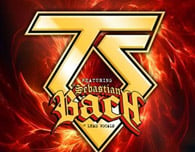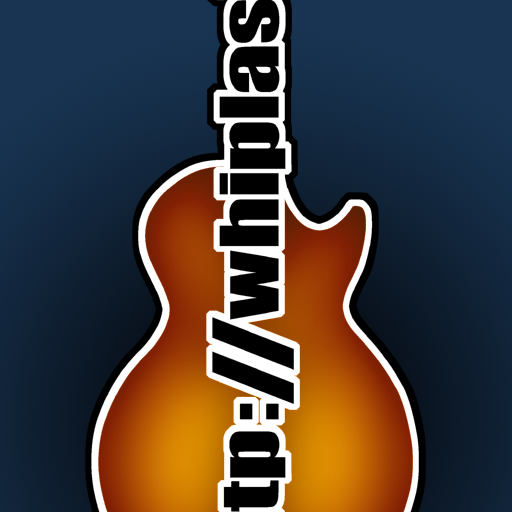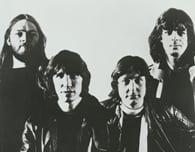Pink Floyd: Waters acusa Gilmour de censura e querer mais crédito que o devido
![]() Por Igor Miranda
Por Igor Miranda
Postado em 01 de junho de 2021
O músico Roger Waters fez críticas ao ex-colega de Pink Floyd, David Gilmour, em uma carta divulgada na internet. De acordo com Waters, Gilmour estaria tentando obter mais crédito que o devido por suas contribuições à banda, algo que, segundo ele, estaria claro em um recente conflito envolvendo o relançamento do álbum "Animals" (1977).

O lendário disco, que antecedeu o também icônico "The Wall" (1979), está para ser divulgado em uma nova versão, remixada, há algum tempo. Todavia, o processo de lançamento foi travado por conta de uma discussão envolvendo o encarte - mais especificamente, as chamadas "liner notes", que são a parte escrita do material.
Roger Waters relata que tais notas do encarte foram redigidas pelo jornalista musical Mark Blake, que já escreveu um livro sobre o Pink Floyd. O texto coloca Waters como figura principal da concepção de "Animals", visto que o artista criou todas as músicas e o conceito das letras, além de ter orientado o desenvolvimento da capa, entre outros detalhes.
Porém, de acordo com Roger, David Gilmour não gostou do conteúdo feito pelo jornalista musical e barrou a impressão no encarte do relançamento de "Animals". Isso causou um novo mal-estar entre ele e Waters, que discordou da omissão do texto.

Encarte removido do álbum, mas publicado na internet
Depois de muita discussão, Roger Waters acabou aceitando a remoção das notas redigidas por Mark Blake. Porém, ele publicou uma carta em seu site onde não apenas critica David Gilmour e sua esposa, Polly Samson, como também divulga todo o conteúdo de Mark Blake, que não estará no encarte.
"Como fui proibido por Dave Gilmour de postar na página do Pink Floyd no Facebook, com seus 30 milhões de seguidores, estou postando este anúncio aqui hoje e na íntegra em meu site", diz Waters, inicialmente, antes de explicar toda a situação.
Ele prossegue: "O que me faz escrever esse texto é que há notas mixagens de James Guthrie, em estéreo e em 5.1, para o álbum "Animals" (1977), do Pink Floyd. Essas mixagens seguem sem serem lançadas por conta de uma disputa relacionada a algumas notas do encarte escritas por Mark Blake. Gilmour vetou o lançamento a não ser que as notas sejam removidas. Ele não contesta a veracidade do que foi escrito por Mark, mas quer que a história permaneça em segredo".

Na visão de Waters, trata-se de "uma pequena parte de uma campanha contínua feita por Gilmour e Samson para dar a Dave mais crédito pelo trabalho dele no Pink Floyd de 1967 a 1985 do que o devido". "Sim, ele era e ainda é um grande cantor e guitarrista. Porém, nos últimos 35 anos, ele contou muitas bobagens sobre quem fez o que no Pink Floyd no período em que eu ainda estava no comando. Houve muito 'nós fizemos isso' e 'eu fiz isso'", afirmou.
Então, Roger divulga todo o conteúdo produzido por Mark Blake para o encarte. "Divirtam-se. Não há nada controverso aqui, apenas alguns fatos", explicou, antes de colar o texto que descreve "Animals".
De fato, o material não parece trazer nenhuma informação equivocada ou controversa: todos os membros da banda são citados, mas há um destaque maior a Waters, por ser o responsável por conceito e composições em geral e vocais da maioria das músicas. O texto de Blake, em inglês, pode ser lido ao fim desta matéria.

"Falsa narrativa"
Na sequência, Roger Waters afirma que está escrevendo uma autobiografia onde, justamente, há referências a alguns dos conteúdos feitos pelo jornalista musical. Ele, então, menciona uma entrevista de David Gilmour à revista Rolling Stone, em 1982, onde o músico afirma ser o responsável pelo som de caixa registradora que dá início a "Money", definindo o padrão rítmico de 7/8 compassos que rege a canção.
Waters transcreveu todo o trecho da entrevista de Gilmour à Rolling Stone, onde ele diz que a gravação surgiu a partir de um processo de tentativa e erro, gravado em loop de fita. "Era tentativa e erro. Você junta as fitas e se soa legal, você usa. Se não, tira uma seção dela e coloca em outra. Às vezes, coloca ao contrário. [...] Fizemos assim e trouxe o som: 'chung, dum, whoosh'. Soava incrível, então usamos", disse David, sobre a entrada de "Money", em 1982.

Logo depois, Roger afirmou: "A razão pela qual as coisas ditas por David Gilmour soam bobagem nessa entrevista é porque são bobagem. Ele não fazia ideia do que estava falando. Por quê? Porque a menos que ele estivesse escondido, David Gilmour não estava lá quando eu fiz a gravação da abertura de 'Money', no estúdio que eu compartilhava com minha esposa, Judy, no fundo do nosso jardim em 187, New North Road, Islington, ao lado do North Pole Pub, onde eu jogava dardos".
O músico concluiu: "A história completa do que aconteceu está em minha autobiografia! Então, espero que isso abra o seu apetite, assim como os de David e Polly (emoji de risos)".
O texto completo de Roger Waters pode ser acessado em seu site oficial. As notas de encarte escritas por Mark Blake, em inglês, e suprimidas do vindouro relançamento de "Animals", que ainda não tem data para chegar a público, podem ser lidas abaixo.

"Mark Blake: Liner Notes
Pink Floyd: Animals
Despite being recorded in London during the long, summer heatwave of 1976, Pink Floyd’s Animals remains a dark album. Its critique of capitalism and greed caught the prevailing mood in Britain: a time of industrial strife, economic turmoil, The Troubles in Northern Ireland, and the race riots of Notting Hill. The album was released on January 23rd 1977, but the roots of Pink Floyd’s tenth studio album go back earlier in the decade. Following the success of 1973’s The Dark Side Of The Moon, Pink Floyd pondered their next move. During a two-to-three week jam session in early 1974, the band worked on ideas for three new compositions. From these sessions the band developed Shine On You Crazy Diamond, (A passionate tribute to Syd Barrett, words by Roger Waters. Added by me, sorry couldn’t help it.) which became the centrepiece of Floyd’s next album, Wish You Were Here, and Raving And Drooling (composed by Roger Waters) and You Gotta Be Crazy written by Waters and David Gilmour.

Raving And Drooling was a tale of violent social disorder, while You Gotta Be Crazy told the story of a soulless businessman clawing and cheating his way to the top. Both were performed live for the first time on the Floyd’s winter tour of 1974. They were both considered for the Wish You Were Here album, but Roger insisted that neither song was relevant to the overall idea, that "Wish You Were Here" was essentially about absence, and as neither song fitted his conception of the record’s overall theme, neither song should be included. The band eventually concurred. Scroll forward two years, and Roger had an idea for the next Pink Floyd album. He borrowed from George Orwell’s allegorical story, Animal Farm, in which pigs and other farmyard animals were reimagined anthropomorphically. Waters portrays the human race as three sub-species trapped in a violent, vicious cycle, with sheep serving despotic pigs and authoritarian dogs. You Gotta be Crazy and Raving And Drooling perfectly fitted his new concept. In the meantime, a year earlier, the group had bought a set of disused church buildings in Britannia Row, Islington, which they’d converted into a studio and storage facility. Prior to this every Pink Floyd studio release had been partly or wholly recorded at Abbey Road studios. Pink Floyd had also found a new recording engineer. Brian Humphries, an engineer from Pye studios, who they had met while recording the sound track for "More", a movie directed by Barbet Schroeder. Brian had gone on to engineer Wish You Were Here at Abbey Road, and also helped them out on the road, so they had got to know him very well. Using their own studio marked a significant change in their working methods. There were setbacks and teething problems, but also a great sense of freedom.

Following Roger’s instincts about the new songs paid off, the songs had an aggressive edge far removed from the luxuriant soundscapes on Wish You Were Here. It was a timely change of direction. At Britannia Row, he renamed Raving And Drooling, Sheep and Gotta Be Crazy became Dogs. The narrative was completed by the addition of two new Waters songs: Pigs (Three Different Ones) and Pigs On The Wing.
On Pigs (Three Different Ones), the lyrics namechecked Mary Whitehouse, the head of the National Viewers And Listeners Association. Whitehouse was an outspoken critic of sex and violence on British television and a topical target for Roger’s ire. The subject matter was bleak, but Nick Mason recalled lighter moments over dubbing songs with special effects and barnyard noises. While Sheep also made room for Roger’s blackly comic variation on Psalm 23: "He maketh me to hang on hooks in high places/ He converteth me to lamb cutlets…" The music and the performance mirrored the intensity of the lyrics. Keyboard player Richard Wright’s eerie-sounding synths and Hammond organ cranked up the unease. While David Gilmour’s shared lead vocal on Dogs and his guitar playing throughout Animals offered a striking counterpoint to Roger’s brutal lyrics. In contrast, Animals began and ended on an optimistic note. The verses of Pigs on The Wing were split in two and bookended the album. Roger’s lyrics and vocal performance of acoustic intro and outro ("You know that I care what happens to you/ And I know that you care for me too…") suggested hope for humanity. The idea for Pink Floyd’s flying pig was also Roger’s. He had already commissioned its building as a stage device for the next tour. Storm Thorgerson and Aubrey Powell of the design company Hipgnosis, had produced a number of design ideas for an Animals sleeve and presented them to the band but none of the band, liked them, and when Roger added his disapproval someone said, "Well why don’t you come up with something better then?" So he did, on the drive from his house in South London to Britannia Row, he regularly passed Battersea Power Station. He was drawn to the imposing brick building, and by the number four. Four in the band, four phallic chimneys, and if the power station were turned upside down then it resembled a table with four legs. He pursued his idea and had a maquette made, a small scale model of the eventual full scale inflatable pig. He then took photographs of Battersea Power station and created a photographic mock up of an album sleeve. The rest of the band loved it. Storm and Po, who had designed all of the previous Pink Floyd album covers, graciously offered to source photographers for the photo shoot, and did. On the first day of the photo shoot, the pig failed to inflate. On the second day, it broke free of its moorings and disappeared into a beautiful brooding sky, prompting a frantic call to the police and a halt to all flights in and out of Heathrow. The pig eventually crash-landed in a farmer’s field in Kent.

The following day, the shoot went ahead without a hitch, great shots of pig in situ but no brooding sky. So Storm and Po stripped Day three Pig into Day two sky, bingo! History. Animals was a hit, reaching Number 2 in the UK and Number 3 in the US. Pink Floyd’s pig, Algie, made its live debut on their subsequent "In The Flesh" tour in 1977. At stadium shows in America, it was joined by another Water’s idea, an inflatable nuclear family comprising a mother, father and 2.5 children, surrounded by the spoils of a consumerist lifestyle: an inflatable Cadillac, oversized TV and refrigerator. Roger called it Electric Theatre. Both the album and the tour signposted the way to Pink Floyd’s next release, The Wall, and to Roger’s ever more ambitious ideas, both in terms of his music, narratives, politics and stage shows. But his themes and ideas explored on Animals have endured. More than 40 years on the album has been remixed in stereo and 5.1. In troubled times and an uncertain world, Animals is as timely and relevant now as it ever was.

Mark Blake"
Receba novidades do Whiplash.NetWhatsAppTelegramFacebookInstagramTwitterYouTubeGoogle NewsE-MailApps



 O hit do rock nacional que boa parte do Brasil não sabe o que significa a gíria do título
O hit do rock nacional que boa parte do Brasil não sabe o que significa a gíria do título Produtor de "Master of Puppets" diz que Kirk não gravou base no disco; "Tudo era o James"
Produtor de "Master of Puppets" diz que Kirk não gravou base no disco; "Tudo era o James" A lendária banda inglesa de rock que fez mais de 70 shows no Brasil
A lendária banda inglesa de rock que fez mais de 70 shows no Brasil O personagem invisível do Angra que merece mais destaque, segundo Rafael Bittencourt
O personagem invisível do Angra que merece mais destaque, segundo Rafael Bittencourt A banda que foi "esmigalhada" pelo Metallica em 1988; "o baixo está baixo demais?"
A banda que foi "esmigalhada" pelo Metallica em 1988; "o baixo está baixo demais?" Angra foi "várias vezes" atrás de Andre Matos, revela Felipe Andreoli
Angra foi "várias vezes" atrás de Andre Matos, revela Felipe Andreoli Dave Mustaine acha que Metallica tentou atrapalhar o sucesso do Megadeth
Dave Mustaine acha que Metallica tentou atrapalhar o sucesso do Megadeth Dave Mustaine afirma que não há motivos para não ser amigo dos integrantes do Metallica
Dave Mustaine afirma que não há motivos para não ser amigo dos integrantes do Metallica O melhor riff da história do heavy metal, segundo Max Cavalera (ex-Sepultura)
O melhor riff da história do heavy metal, segundo Max Cavalera (ex-Sepultura) "Ninguém do Angra precisa de uma reunião para ter dinheiro", afirma Edu Falaschi
"Ninguém do Angra precisa de uma reunião para ter dinheiro", afirma Edu Falaschi Por que Geddy Lee achou que Anika Nilles não seria melhor opção para substituir Neil Peart?
Por que Geddy Lee achou que Anika Nilles não seria melhor opção para substituir Neil Peart? O disco pelo qual Max Cavalera gostaria de ser lembrado; "Foi o mais difícil"
O disco pelo qual Max Cavalera gostaria de ser lembrado; "Foi o mais difícil" Rock e Heavy Metal - lançamentos de faixas, álbuns e mais novidades
Rock e Heavy Metal - lançamentos de faixas, álbuns e mais novidades Além do vocalista, Twisted Sister muda baterista para shows de reunião
Além do vocalista, Twisted Sister muda baterista para shows de reunião 5 bandas de rock que melhoraram após trocar de vocalista, segundo Gastão Moreira
5 bandas de rock que melhoraram após trocar de vocalista, segundo Gastão Moreira




 Bootleg lendário do Pink Floyd gravado por Mike Millard será lançado oficialmente em CD no RSD
Bootleg lendário do Pink Floyd gravado por Mike Millard será lançado oficialmente em CD no RSD O disco obscuro que Roger Waters acha que o mundo precisa ouvir; "Um álbum muito importante"
O disco obscuro que Roger Waters acha que o mundo precisa ouvir; "Um álbum muito importante" Os 5 álbuns que podem fazer você crescer como ser humano, segundo Regis Tadeu
Os 5 álbuns que podem fazer você crescer como ser humano, segundo Regis Tadeu O prato onde o Pink Floyd comeu, apesar de Roger Waters torcer o nariz para o cardápio
O prato onde o Pink Floyd comeu, apesar de Roger Waters torcer o nariz para o cardápio Zakk Wylde e David Gilmour discordam sobre o que poderia ter estragado "Dark Side"
Zakk Wylde e David Gilmour discordam sobre o que poderia ter estragado "Dark Side" Zakk Wylde acredita que tecnologia poderia ter arruinado discos clássicos
Zakk Wylde acredita que tecnologia poderia ter arruinado discos clássicos 3 clássicos do rock cuja parte falada rouba a cena, segundo a American Songwriter
3 clássicos do rock cuja parte falada rouba a cena, segundo a American Songwriter Os 5 melhores álbuns de todos os tempos, segundo Nick Mason do Pink Floyd
Os 5 melhores álbuns de todos os tempos, segundo Nick Mason do Pink Floyd "Stairway To Heaven" ou "Comfortably Numb", qual o melhor solo de guitarra de todos os tempos?
"Stairway To Heaven" ou "Comfortably Numb", qual o melhor solo de guitarra de todos os tempos? Produtor do álbum de David Gilmour não sabia quem é Richard Wright
Produtor do álbum de David Gilmour não sabia quem é Richard Wright


